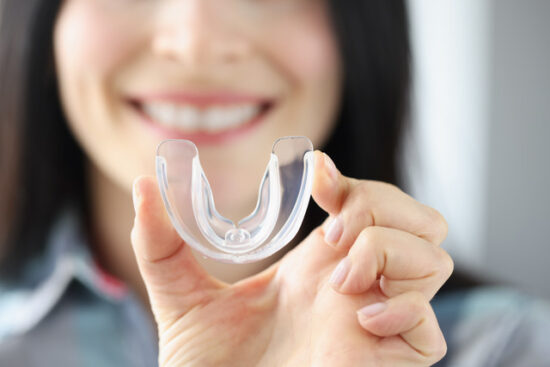
Has your dentist prescribed a night guard for you? This may be because your teeth show signs of bruxism, which is a formal name for the grinding and/or clenching of your teeth, and night guards offer protection against the negative forces and pressures that are exerted when a person is unconscious. After all, when you are sleeping, you have no control over it.
We encourage you to reach out to our dentist in Millwoods to learn more about acquiring night guards. At Agape Dental, we’re here to assist our patients with every one of their needs. Please call us today.
What Exactly is a Night Guard?
A night guard is a specific dental appliance that is worn while sleeping to minimize damage caused by bruxism.
In simple terms, it is a mouthpiece that functions like the ones that athletes wear, except this is worn while you are in bed sleeping. The device prevents your upper and lower row of teeth from scraping together.
Most night guards resemble transparent trays, though they are significantly thicker than the trays that you can use to whiten your smile. Depending on how hard you are clenching and what your dentist believes is best, you can acquire a hard or soft night guard, since each one offers a different degree of protection. Many night guards only cover the upper teeth, but in some cases, such as if you wear braces, your dentist may create a guard for your bottom teeth as well.
It is important to know that whereas night guards safeguard your smile from the damages associated with bruxism, they do not treat the problem nor stop you from grinding or clenching your teeth.
Just like with sports mouth guards, you can acquire stock or boil-and-bite night guards at a drugstore. But these kinds of devices are not meant for long-term use, nor do they offer the proper amount of protection due to an inadequate fit. Therefore, it is essential to speak to a dental professional about acquiring custom night guards in Millwoods which provides a precise fit and which is much more comfortable.
Signs of Teeth Grinding and Problems a Night Guard Can Address
Some of the most prevalent problems that a night guard can address are as follows:
- Tenderness when biting and chewing food
- Lockjaw
- Tooth sensitivity
- Interruptions during sleep
- Facial pain
- Earaches
Other issues this appliance can help manage include:
TMD
Temporomandibular joint disorder (TMD) can manifest from tooth grinding. It is characterized by the damage it causes to your smile, jawbone, and the surrounding muscles. The joint itself attaches your jaw to the base of your skull. When it experiences an injury, it can hinder you from opening and closing your mouth and cause facial swelling and lockjaw.
Headaches
Headaches and neck aches can be major symptoms related to TMD caused by bruxism. Each of these systems is closely connected, and when one area is damaged, it can trigger a domino effect. For TMD and its symptoms, a night guard will effectively alleviate jaw pain. The guard separates your top and bottom row of teeth and shifts your jawbone to the proper position.
Tooth Damage
If you do not wear a night guard while sleeping, it can damage the functionality and aesthetic appearance of your smile. Chipped or cracked teeth, and enamel erosion can occur. Food particles and bacteria can easily gather in these crooks, eventually leading to infections.
Fortunately, getting a night guard from a dentist near you can preserve your teeth and help you maintain your beautiful smile.
Long-Term Issues
Problems that are not solved quickly can grow to be more serious. If you wait too long to confront your habits, a night guard will not be an effective treatment, and you will have to consider more complex solutions like oral surgery.
Forms of Night Guards Available
Two of the main types of night guards are:
Over-the-counter (OTC): This night guard can be easily purchase via your local drugstore. They are affordable but they’re not known for being durable. They don’t provide satisfactory protection due to their “one-size-fits-all” or “boil-and-bite” format.
Custom: Customized night guards are frequently recommended by dental experts. They’re designed in accordance with the patient’s unique oral dimensions. And, since it’s made using high-quality materials, not only will it last a long time, but it’s more comfortable to wear.
There are 4 types of customized night guards:
- Soft: Patients who are aggressive tooth grinders can benefit from a soft night guard, offering more of a cushion for their smiles. Remember that these guards don’t last quite as long, since the soft plastic can deteriorate down quicker when the wear bites down on it repeatedly.
- Hard: Instead of plastic, acrylic is used to make hard night guards. While this makes the device itself less flexible, they do last longer.
- Dual Laminated: A dual laminated night guard is made from a combination of hard and soft plastic – the soft material is on the inside to cushion the teeth, and the hard material is reserved for the outside of the appliance.
- Thermoplastic: When dropped into warm water, the material of the guard will “adjust itself” by becoming more flexible. When you remove it, it will fit over your teeth much more comfortably.
Benefits and Drawbacks of Wearing a Night Guard
Understanding the benefits and drawbacks of a night guard is important when it comes to making the best decision for your oral health and wellness.
Pros
- Protects teeth from damage: This device prevents teeth from becoming worn down, stops their enamel from being stripped away, reduces sensitivity, and the fragmentation of dental prosthetics like crowns or fillings.
- Prevents jaw pain and headaches: Most people don’t know that when excess pressure is exerted onto our jaw it cancause pain. And, since our jaws are so closely connected to our head and facial systems, we can experience head, ear, and neckaches too.
- Encourages a good night’s sleep: Night guards can help you sleep more deeply. It also encourages your muscles to relax, allowing constant, undisturbed flow of oxygen to travel through your airways.
- Saves money: Bruxism can lead to issues that require different restorative treatments. Not only does this take up a lot of your time, having to fit visits into your personal schedule, but it also costs you money. Night guards saves you both time and money.
Cons
- Adjustment period: The average adjustment period is around 3-4 weeks. The easiest way to ensure that you can integrate the device into your routine is to dutifully wear it every night.
- Cost: Night guards made by a dentist near you can be expensive. Make sure you review the details of your coverage and talk to your insurance provider. Customized night guards tend to cost anywhere between $300 to $800.
- Treatment limitations: Again, night guards address symptoms but not the root causes of issues, which may include anxiety, stress, or another medical condition, remain. To ensure that bruxism doesnot persist, consider talking to a sleep expert or mental health specialist.
- Not permanent: Eventually, your device will need replacing.
At Agape Dental, We are Here to Help You!
Are you looking to acquire a night guard? Come on into our nearby dental clinic! Our staff is excited to meet you and collaborate with you on your oral health journey!
Call, email, or drop into our physical dental clinic whenever it works best with your schedule!

